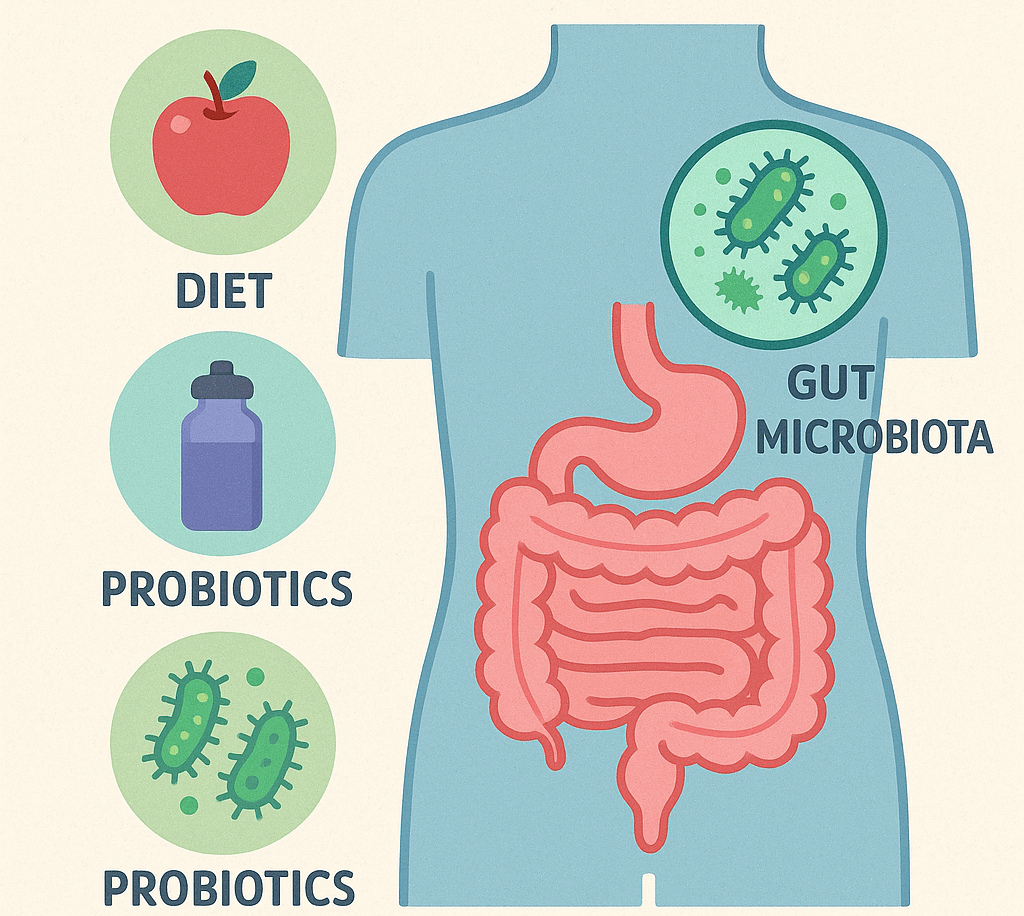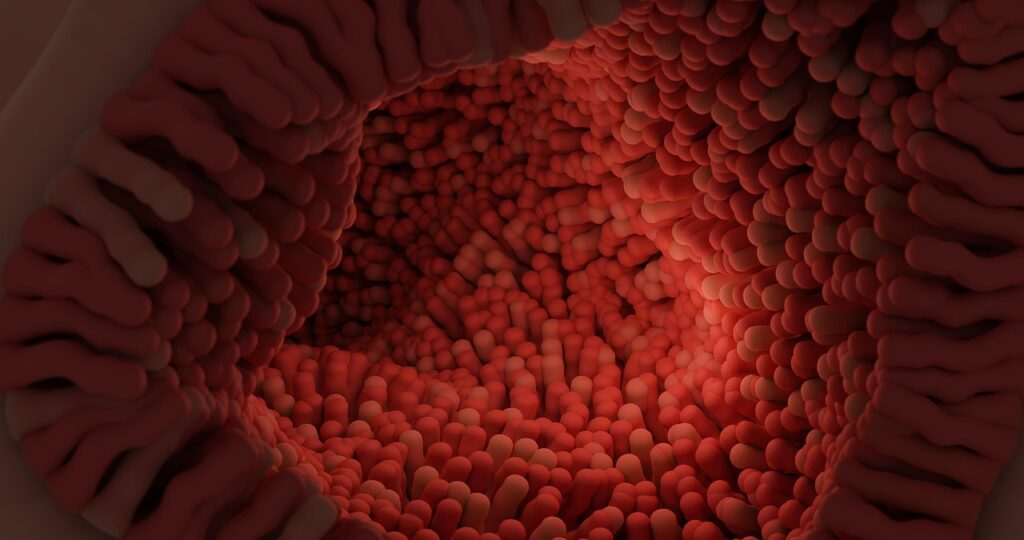Table of Contents
ToggleWhat is Gut Health and Why it matters for Wellness?

If you’ve ever had “butterflies” before a big event, felt bloated after a heavy meal, or noticed your mood shift for no obvious reason, you’ve experienced firsthand how connected your gut is to the rest of your body. But “gut health” isn’t just a wellness buzzword; it’s a real, science-backed concept that can make or break your overall well-being.
In this post, we’ll unpack what gut health means, why it’s so important, and what you can do to keep it in top shape, especially if you live in the U.S., where digestive issues are surprisingly common.
Understanding Gut Health: More Than Just Digestion
Your “gut” isn’t just your stomach; it’s your entire digestive tract, from your mouth down to your intestines and colon. Inside your gut lives a world as a whole of trillions of microorganisms, bacteria, viruses, fungi, and other microbes collectively known as the gut microbiome.
Think of the gut microbiome like a bustling city:
Some residents (good bacteria) work hard to keep things running smoothly, helping you digest food, absorb nutrients, and fight off harmful invaders.
Others (bad bacteria) can cause trouble if they multiply too much, leading to bloating, infections, or even long-term health issues.
When these microbial “citizens” live in balance, your gut is healthy. But when that balance is thrown off, due to poor diet, stress, antibiotics, or other factors, it can cause gut dysbiosis, a state linked to a wide range of health problems.
Why Gut Health Matters So Much
Gut health impacts far more than your digestion. Let’s break down its main roles.
1. Nutrient Absorption
The gut is where the magic of turning food into fuel happens. Your intestines break down food into vitamins, minerals, amino acids, and fatty acids that your body needs for energy, growth, and repair.
If your gut lining is inflamed or damaged, you may not absorb nutrients effectively, leading to fatigue, hair loss, weak immunity, or even nutrient deficiencies.
Fun fact: The small intestine alone has a surface area of about 2,700 square feet, roughly the size of a tennis court, just for nutrient absorption.
2. Immune System Support
About 70% of your immune system is located in your gut. The good bacteria in your microbiome help “train” your immune cells to recognize friendly vs. harmful substances. A healthy gut can reduce the risk of autoimmune diseases and chronic inflammation.
3. Mental Health & The Gut-Brain Connection
Your gut and brain are linked by the vagus nerve, a direct communication line. Scientists call the gut the “second brain” because it produces about 95% of your body’s serotonin, a neurotransmitter that regulates mood, sleep, and digestion.
Poor gut health has been linked to anxiety, depression, and brain fog.
4. Weight Management
A healthy gut microbiome may help regulate metabolism, reduce cravings, and prevent unnecessary fat storage. Certain probiotic strains, such as Lactobacillus gasseri, have been studied for their potential to support healthy weight loss.
5. Protection Against Chronic Diseases
Research shows that gut dysbiosis is linked to conditions like:
Type 2 diabetes
Heart disease
Irritable bowel syndrome (IBS)
Inflammatory bowel disease (IBD)
Certain cancers
Keeping your gut healthy may reduce your risk for these long-term issues.
The State of Gut Health in the U.S.
Unfortunately, gut health isn’t doing great in America.
Key stats:
60–70 million Americans are affected by digestive diseases each year (National Institute of Diabetes and Digestive and Kidney Diseases).
IBS alone affects 10–15% of the U.S. population.
Diets high in ultra-processed foods and low in fiber are major contributors to poor gut health in the U.S.
With busy lifestyles, high stress levels, and easy access to fast food, it’s no wonder gut problems are on the rise.
Signs Your Gut Might Be Unhealthy
You don’t need to guess; your body often gives clear signals that your gut is out of balance:
Frequent bloating, gas, or diarrhea
Chronic constipation
Food intolerances
Frequent illnesses or infections
Brain fog or poor concentration
Mood swings, anxiety, or depression
Unexplained fatigue
Skin issues like acne, eczema, or rashes
How to Improve and Maintain a Healthy Gut
The good news? You can start improving your gut health today, no fancy detoxes required.
1. Eat a Fiber-Rich Diet
Fiber feeds your good gut bacteria. Aim for 25–30 grams per day from sources like:
Whole grains (oats, brown rice, quinoa)
Fruits (berries, apples, bananas)
Vegetables (broccoli, spinach, carrots)
Legumes (beans, lentils, chickpeas)
2. Include Fermented Foods
Fermented foods contain live probiotics that can boost your microbiome diversity:
Yogurt (with live active cultures)
Kefir
Sauerkraut
Kimchi
Miso
Kombucha
3. Stay Hydrated
Water helps food move smoothly through your digestive tract and supports nutrient absorption. Aim for at least 8 cups daily, more if you’re active.
4. Limit Processed & Sugary Foods
Ultra-processed foods and excess sugar feed harmful bacteria, throwing off your gut balance.
5. Manage Stress
Chronic stress can change your gut bacteria composition and increase inflammation. Try meditation, yoga, deep breathing, or simply taking breaks during the day.
6. Consider Probiotic & Prebiotic Supplements
Probiotics introduce beneficial bacteria.
Prebiotics (like inulin and resistant starch) feed your existing good bacteria.
If you’re considering supplements, look for strains with proven benefits and check with your healthcare provider.
7. Get Enough Sleep
Poor sleep disrupts your microbiome and increases stress hormones. Aim for 7–9 hours of quality rest each night.
| Dietary Habits in the U.S. | How Common It Is | Impact on Gut Health |
|---|---|---|
| Low fiber intake | 95% of Americans don’t meet the daily fiber recommendation | Reduces the diversity of good gut bacteria, slows digestion |
| High consumption of ultra-processed foods | About 58% of daily calories come from ultra-processed foods | Feeds harmful bacteria, increases inflammation |
| High sugar intake | The average American consumes ~17 teaspoons of added sugar daily | Promotes growth of harmful microbes, disrupts microbiome balance |
| Low fermented food intake | Only a small fraction regularly consume foods like yogurt, sauerkraut, or kefir | Missed opportunity to introduce beneficial probiotics |
| Frequent antibiotic use | 268 million antibiotic prescriptions per year | It can wipe out good gut bacteria along with harmful ones |
Final Thoughts
Gut health isn’t just about avoiding stomach aches; it’s the foundation of your overall wellness. A balanced gut microbiome supports your digestion, immunity, mood, and even weight management. Unfortunately, many Americans struggle with gut issues due to diet, stress, and lifestyle habits, but the solution often lies in simple, consistent changes.
If you start treating your gut like the vital health hub it is, nourishing it with whole foods, hydration, rest, and care, you’ll likely notice improvements not just in digestion, but in your energy, mental clarity, and long-term health.


